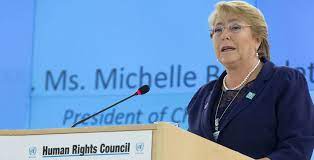By Asmau Ahmad
The United Nations Rights Chief Michelle Bachelet, on Tuesday called for greater coronavirus vaccine solidarity and prioritising human rights in post-pandemic economic recovery.
Bachelet who made the call at the Human Rights Council in Geneva, Switzerland, said the ongoing COVID-19 crisis had caused and perpetuated “truly shocking” inequality that has affected the world’s most vulnerable individuals.
She maintained that the inability of countries to uphold fundamental liberties – such as justice, quality education, decent housing and decent work – had “undermined the resilience of people and States.”
This had left them exposed to what she called a “medical, economic and social shock”, highlighting that an additional 119 to 124 million people had been pushed into extreme poverty in 2020.
The High Commissioner for Human Rights cited the Food and Agriculture Organisation (FAO) data, indicating that food insecurity rose to an unprecedented 2.38 billion people.
“Vital gains are being reversed – including for women’s equality and the rights of many ethnic and religious minority communities and indigenous peoples.
“Cracks in the social fabric of our societies are growing wider” with “huge gaps between rich and poorer countries (that) are becoming more desperate and more lethal.
“We must ensure that States’ economic recovery plans are built on the bedrock of human rights and in meaningful consultation with civil society.
“There must be steps to uphold universal health care, universal social protections and other fundamental rights to protect societies from harm, and make all communities more resilient,” she said.
On the issue of glaring coronavirus vaccine and therapeutic shortages in many developing countries, the High Commissioner urged States to “act together, in solidarity”, to distribute the jabs.
“Today, hospitals in some regions have essentially collapsed, with patients unable to find the care they need, and oxygen almost completely unavailable.’’
She described it as a crisis of vaccine inequity (that) continued to drive deeper divides into the heart of the international community”.
Echoing those remarks, Nobel Laureate and economist, Prof. Joseph Stiglitz, described how COVID-19 had barely affected those at the top end of the global economy, while those at the bottom have suffered massively in respect of their jobs, health and their children’s education.
The coronavirus has not been “an equal opportunity virus”, he insisted; “it has had a devastating effect on the bottom parts of our economy, our society”.
He added “While those at the top, many of them have done very well. Most of them have been able to carry on, continuing their jobs on Zoom, continuing their incomes, almost without interruption.”
Stiglitz reminded the Human Rights Council that access to vaccines “is almost part of a right to life, and yet, access to the vaccines, while is very easy in the U.S. and other advanced countries, is extraordinarily difficult in emerging economies and almost impossible in most developing countries”.
Echoing that message, UN Special Rapporteur on the rights of indigenous peoples, José Francisco Cali Tzay, expressed concern that post-pandemic recovery efforts by many States were continuing to have “negative impacts” on indigenous peoples.
“Nationwide measures to stop the pandemic are being applied to indigenous territories without their free, prior and informed consent and without taking into account the systemic barriers faced by recipients,” the Special Rapporteur said.




